Interview: Simon Gerrans
After stints with Cervélo and Sky, Australian national champ Simon Gerrans has gone home to race for GreenEdge and has started the season in killer form.
Words by Gregor Brown
Monday March 19, 2012. This feature originally ran in Cycle Sport April 2012.
For Cycle Sport's analysis of Milan-San Remo, click here.
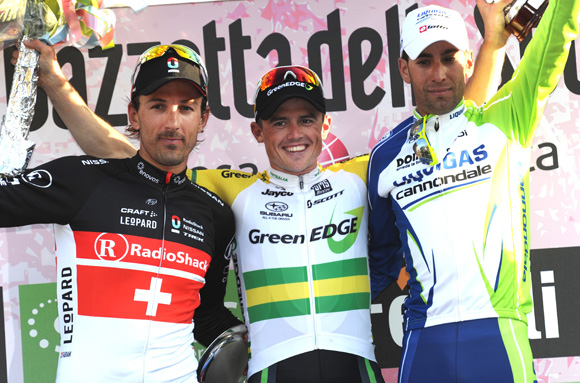
Simon Gerrans helped his GreenEdge team to a dream debut at their home race, winning the Tour Down Under. The combination was perfect: the Australian Champion, Australia's first top-level team and Australia's biggest stage race. It continues a run of antipodean success which started in 2011: last year, Australians won four ProTour stage races – more than any other nation.
Both GreenEdge and Gerrans needed the win. The team’s hunt for a sponsor goes on, and the win will have done their chances of success no damage. For his part, notwithstanding last year’s Tour of Denmark, Gerrans took his first major win since a 2009 Vuelta stage.
"I think that we couldn't ask for a better way to start the season, not only for me, but for GreenEdge, the supporters of the team and the Australian public," explains Gerrans. "It's a dream way to start the year."
The latest race content, interviews, features, reviews and expert buying guides, direct to your inbox!
National hero
Gerrans sits with Cycle Sport in the lobby of the Hilton in Adelaide, South Australia, on the eve of his confirmation as winner. Hours later, he will race the final circuit around the city centre, similar to the Tour de France's Parisian stage, and clinch the race overall.
You can see GreenEdge followers everywhere in the city. Temperatures rise to 38 degrees (Celsius), but the fans keep their faces shaded with green team caps. One year ago, the former Cycling Australia head, Shayne Bannan announced the team. The money would come from Gerry Ryan for three years, one year to build and two years, 2012 and 2013, to race. In the two-year period, preferably this year, Ryan wants to see Bannan secure a sponsor so that the team can continue and his finances are not wasted. They’ll need 10 million euros a year.
"That's why I worked really hard this pre-season to be in good shape for these Australian races. I knew it would be so important to start the season going well,” Gerrans explains.
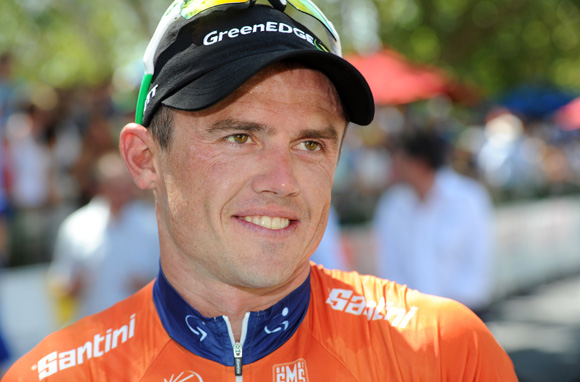
The 31-year-old is eloquent and calculating. When interviewed, he seldom breaks eye contact. If you write a note, he looks down to read your words. If you are speaking, he is analysing your question. His answers are well thought-out, he will even give pause before speaking to make sure he says exactly what he wants.
Phil Anderson led the modern day Aussie charge. In 1981, he became the first rider from his country to wear the Tour de France's yellow jersey. He says of Gerrans, "He's probably not the strongest rider out there, but he's clever."
The two know each other well. They lived on nearby farms in Mansfield, northeast of Melbourne, and Anderson pushed his young neighbour towards cycling following a motorbike crash.
Gerrans has a record of his own: he was the first Australian to win a stage in all three Grand Tours. Those wins – at the 2008 Tour in Prato Nevoso, 2009 Giro in Bologna and 2009 Vuelta in Murcia – were calculated and clever. All three wins were from escapes.
In fact, ahead of the Tour Down Under he won the Australian Championships from an escape. He attacked with Matt Lloyd and Richie Porte on a climb and then sprinted ahead of his companions to win the green and yellow national jersey.
"I saw it as one of my big weaknesses when I was trying to break through: I could do a bit of everything, but I wasn't really good at one thing. But now, this is one of my strengths," Gerrans explains.
"I'm far from being the best climber, far from being the best sprinter, far from being the strongest guy on the road... You become more tactically astute from not being the strongest guy there, so you really have to learn how to race, and learn how to be clever to win the races. You’ve got to learn tactics."
"He's a smart rider, very economical in the way he applies himself," Anderson adds. "If he's having a bad day, he'll just be hiding. On a good day, he is suddenly on fire, in a break and getting a win."
Star turn
Bannan wanted Gerrans as one of his star riders for GreenEdge for this reason. The team will focus on one-day races with riders like Matt Goss and on stages in tours this season. Gerrans is able to win one-day races, stages and the overall in small stage races, like the Tour Down Under.
"In terms of physiology, he might not be the best rider there," Bannan explains, "but he uses his intelligence and the situation."
Gerrans won the Tour Down Under ahead of Alejandro Valverde, even if they sat equal in the overall classification times after the key Willunga stage. He fought with Valverde on the hilltop finish, failed to win, but collected a time bonus for second place. The two moved up in the overall classification, and Gerrans took first thanks to his lower aggregate placings during the week.
Before we sat down in the Hilton lobby, he told Cycle Sport that he had been attentive of his placings all week because he knew the Tour Down Under is always a close fight. He thought to place himself highly in the bunch sprints, something he says that Valverde failed to consider. His intelligence and his strength on the Willunga stage won him the race.
"I've heard him described as a cockroach," Bannan adds. "When the world comes to an end, you'd expect the only living being around to be a cockroach because they fight and they're indestructible, and that's Simon Gerrans."
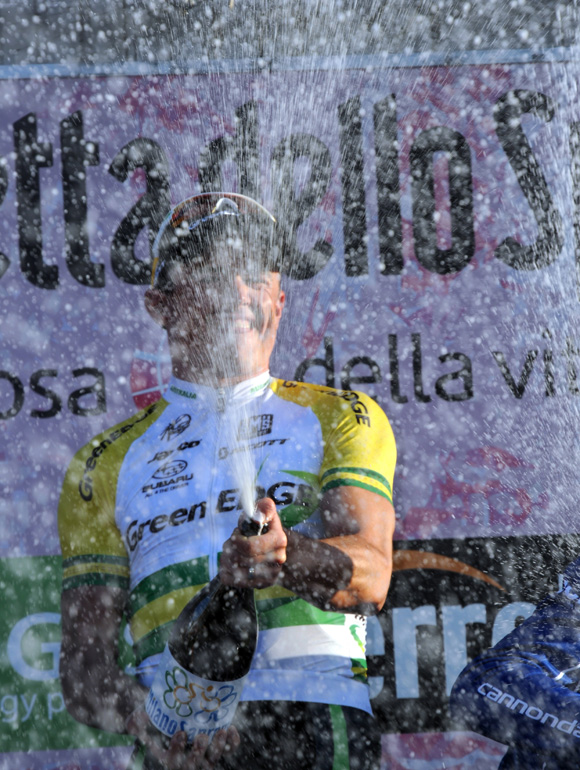
Victorian regime
Gerrans returned to Australia in October at the end of the 2011 season. After a small break, he started training again, including an occasional ride with Anderson in the Victoria countryside. He combined these long rides with time in the gym to build his base.
He says he can train specifically for breakaways, but he prefers to train for all aspects: climbing and sprinting. "Really, you focus in the areas that you want to excel at," he explains. "I've focused on more intensity to come into form for January."
Then, it is just a matter of winning. Or trying to.
This year, Gerrans will focus on the Ardennes Classics in April, the Tour de France in July and, a series of one-day races in the autumn, from Clásica San Sebastián to the World Championships. The Tour will be his only three-week race and he has yet to inspect the route. He will look at the route book only once the race nears to pinpoint which stages will suit a breakaway.
"Once I'm in the breakaway, I leave nothing out there," he says, looking me in the eyes.
"I make sure I'm committed to it and doing everything I can to win on that day. The opportunity might not come up again. Or, you spend all day in the breakaway, and you know you will use up so much energy and you won't get another chance. If you really empty yourself to try to win that stage, you're not going to recover enough in that tour to have an opportunity again."
He estimates three to four stages suit breakaways in the Tour de France. Last year, there were four. The odds are not good, especially if you just leave it to chance.
"You basically wait until after a key GC day, when things settle down, and bang, that's the day you focus on," he says.
He and his Sky team-mates had more opportunities last year after they lost captain Bradley Wiggins to a broken collarbone. Edvald Boasson Hagen gave Sky two wins, one of which came from an escape. Gerrans, meanwhile, left the race empty-handed.
"I was really busting my ass to get into the breakaways and I just couldn't nail it. The breaks were taking 50, 60, up to 100 kilometres to go away. By the time the break went, everyone was on his hands and knees. It was often the guys that weren't really trying that hard, they were just sitting back and saying, 'Oh, I'll have a go now.' And, bang and they were in there. I had the form that if I'd made the break I could've taken a win."
Empty Sky
Gerrans split with Sky at the end of last year, after two seasons. His time with the British team was light on results in comparison to those he gained with Crédit Agricole, Cervélo TestTeam and already with GreenEdge. His first season with the British team in 2010 was bleak following 2009 when he won a Giro stage, a Vuelta stage, the GP Plouay and placed top ten in all three Ardennes Classics.
Sky went to the Tour with Wiggins as their leader. Wiggins failed, while Gerrans had to abandon after his third crash in one week. We saw him limping through a hotel lobby in Reims, early in the race, and he looked awful.
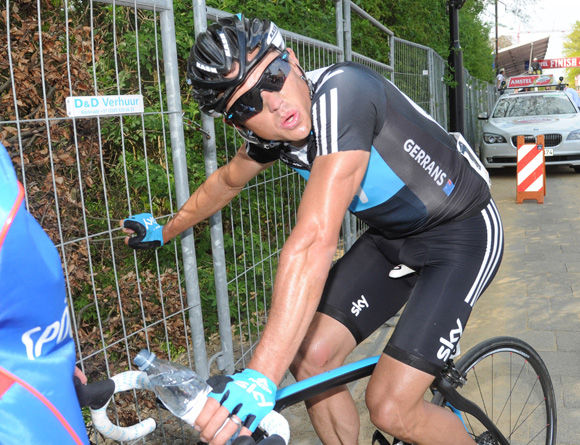
"I went home looking like I'd been run over by a truck with a black eye, stitches in my face and a broken arm," he says. "I had a tough year with Sky," he concludes.
A crash in the Critérium International stage race had already complicated his spring. He had been pushing himself hard for Paris-Nice in March and was skinnier than ever before. He admits that maybe he was pushing himself "too hard" at that point.
"The crash," he adds, "basically wiped me. My Ardennes campaign was a write-off."
The season became more complicated for Sky and Gerrans in the Vuelta a España. He and his team-mates were sick in the first week and soigneur, Txema Gonzalez died. Sky pulled out of the race and Gerrans went home without proper race-training for the Worlds in Melbourne. Season over.
He and Sky had a better time last year. Gerrans arrived in shape for the Ardennes, placed third in Amstel Gold and "was caught out when the Schlecks and Gilbert went" in Liège-Bastogne-Liège. After the Tour, he maintains that he had his “best form ever" for August. Similar to the Tour Down Under, he placed second in a stage of the Tour of Denmark and took the overall lead. He defended the lead, won the race and left Sky on a high note.
"I really raced until I had nothing left for Sky," he says. "I felt that was important because Sky did everything right by me for two years, so I wanted give everything back to the team."
Too good to turn down
For a third time, after Cervélo and Sky, Gerrans joined a brand-new team for 2012. GreenEdge was too ideal to pass by and besides, Sky was becoming stronger and making important signings, like Mark Cavendish.
"To be honest, I was hesitant to sign with another new team," Gerrans explains. "I'd already gone through the teething problems at Cervélo and at Sky, but when I heard who was involved, the riders they were signing, I thought, 'Yeah, I want to be there.'"
"I think he learnt in those years with Sky," says Bannan, "but he had bad luck with illness and injury."
Bannan says he expects greater things out of his rider over the next two years. Gerrans confirms that his salary is slightly less than it was at Sky, but that the money was not his first thought.
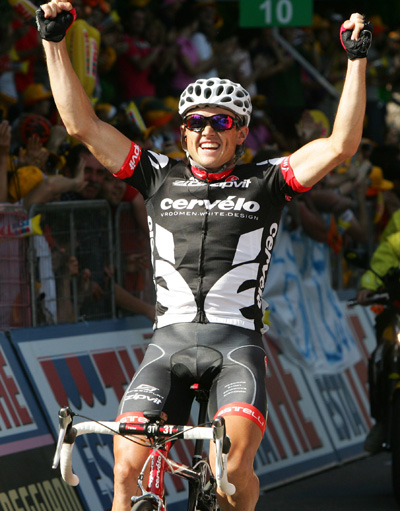
"I see my opportunities that I have at GreenEdge far outnumber what I had at Sky," Gerrans continues. "It was not a financial decision; it was the environment they were offering."
Cavendish joining and Wiggins having a very real possibility to win the Tour has many pundits questioning how Sky will manage its Tour de France team. Plus, its secondary riders – Chris Froome, Geraint Thomas and Boasson Hagen – are maturing and demand their space in the Tour team. It was starting to look a little cramped.
GreenEdge will field stage hunters for the Tour. In fact, it will be their outlook for most of the season: scoring wins and raising the team’s profile.
"If GreenEdge hadn't have come along, I would have seen no reason to leave Sky. With GreenEdge, the Ryan family – who I have a long history with – the objectives of the team... It all just fell in line. At the same time, everyone was improving at Sky, and then you throw in Cav into the mix... As much as I enjoyed it, I just saw that my time at Sky coming to an end. The opportunities for a guy like me were becoming less and less. In the middle of last year, I was looking at the team and who they were signing, I thought, 'Wow. I don't even see myself making the Tour de France team in Sky.' It became pretty clear."
Fighting chance
Gerrans will build for the Ardennes classics with several stage races: the Giro di Sardegna, Paris-Nice and Tour of the Basque Country. He has come close in all three hilly Spring classics, but is thinking of skipping the mid-week Flèche Wallonne to give himself more of a fighting chance in Liège-Bastogne-Liège.
Gilbert and the return of Valverde concern him, but he remains hopeful he will finally win a Classic.
"I need to just keep improving, just stick to what I'm doing," Gerrans says. "Every year, I'm inching closer. If I stick to my guns, soon enough I'll be standing on top of the podium in one of those races."
"He's now one of the more senior members in the group, which is scary because I always remember him as a young kid," Anderson adds. "There are younger riders who still need a few years to reach their potential. He has been brought in as a mentor, but also to get results."
GreenEdge will field different teams for the Tour of Romandy and the Giro d'Italia. Gerrans will return to the Dauphiné Libéré in June and team up with Goss for the Tour de France. Not having an overall classification contender to ride for will free him to focus on stage wins.
"I'm not sure what tactic we will play, but Matt Goss is a real green jersey contender. He can be a consistent finisher in the sprint finishes and he can be with some of the fastest guys on his day," Gerrans continues. "I'll have some opportunities when it comes to the mountain days, mid-mountain days and when it's unlikely to be a bunch sprint."
It’s time for Gerrans to leave. Fans are waiting for autographs in the Hilton and his team-mates are anxious to lead him to the Tour Down Under win. With Goss and Cadel Evans, he is basking in the glory days of Australian cycling.
"I'm getting noticed even when I'm out in casual clothes, at the super market or out to lunch. It's a bit flattering that people take notice of what we are doing over in Europe."
This feature originally ran in Cycle Sport April 2012.
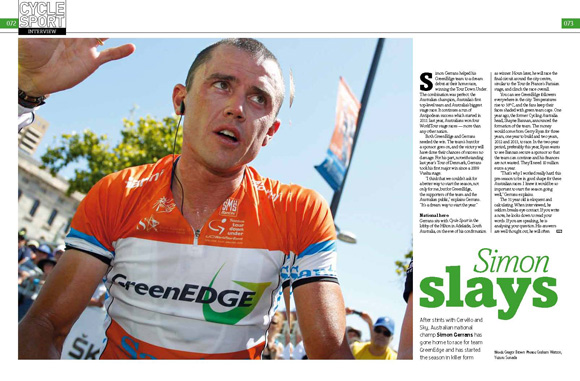
Edward Pickering is a writer and journalist, editor of Pro Cycling and previous deputy editor of Cycle Sport. As well as contributing to Cycling Weekly, he has also written for the likes of the New York Times. His book, The Race Against Time, saw him shortlisted for Best New Writer at the British Sports Book Awards. A self-confessed 'fair weather cyclist', Pickering also enjoys running.